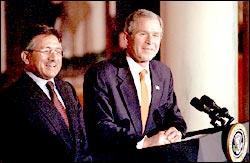In the final part of the series based on mission papers prepared by the US embassy in Islamabad, we examine the gains, military and otherwise, for Pakistan provided it continues to toe the American line.
As Pakistan turns into America's launch pad and frontline state in its fight against terrorism, there is much that General Pervez Musharaf's country stands to gain.
 According to documents available with rediff.com, the US embassy in Pakistan has recommended a massive list of military wares, financial aid on several fronts and other assistance as it re-engages Islamabad.
According to documents available with rediff.com, the US embassy in Pakistan has recommended a massive list of military wares, financial aid on several fronts and other assistance as it re-engages Islamabad.
Engagements after 9/11 "have convincingly shown that US global and regional interests require close engagement with Pakistan. The use of sanctions in a different era to alter Pakistani policy did not work. Engagement, particularly after September 11, has yielded better results and promises to lead to a stronger, healthier and more mutually beneficial relationship between the United States and Pakistan," say the papers.
So what does this 'close engagement' entail?
The most visible is the request for military equipment approved by the US defense attaché to Islamabad.
The list submitted last year end has UH-II utility helicopters, AH-I attack helicopters, VHF/UHF aircraft radio sets, T-37 flight training aircraft, AN/FPS-117 surveillance radars, E-2C warning and control aircraft, Bell 407 reconnaissance helicopters and I-GNAT unmanned aerial vehicles among other things.
Pakistan is also asking for upgrade and pilot training for its P-3C patrol aircraft, seen as a potent weapons platform against Indian naval vessels.
Another request approved by the US defense attache is for the C-130 cargo aircraft, similar to the one used to transport critical nuclear systems to North Korea in exchange for missiles.
After the mandatory approval, most of the equipment would be bought by Pakistan using the US government's Foreign Military Financing grant. Pakistan is set to get almost $ 200 million under this for 2003-2004. The Defense attaché says Pakistanis "have the $75mil (million) FY02 (financial year 2002) supplemental budget to draw from."
The cost of the C-130 cargo aircraft and pilot training would be from money allotted under fiscal 2002, the attaché says. All the items on the list have been informally vetted with US services and "reflect what we think will be approved," he adds.
All these "items are defensive in nature and will be used for Pakistani participation in the war on terror and counter drug surveillance operations," he concludes.
Besides the military equipment and training, Pakistan would also receive several hundred millions of dollars for various activities.
The US mission has recommended that Pakistan be provided $ 200 million each in fiscal 2003, 2004 and 2005 under the Economic Support Fund, which would be used to pay for the bilateral debt. US President George W Bush had pledged this amount during General Musharraf's visit to the US in February 2002.
The USAID would provide development assistance/child survival grants of $ 50 million annually from 2003 to 2005. These funds are meant for poverty alleviation, human development and economic revitalisation.
Over $ 50 million has been projected directly for counter-terrorism and counter-narcotics fight. A sizeable chunk of this amount would go to border security along Pak-Afghan border, small portions each to law enforcement, crop control (of drugs) and programme support.
In 2002, US had provided a special $ 73 million package for improving security along the Pak-Afghan border.
For foreign military funding, the projection by the US mission for each year beginning 2003 till 2005 was $150 million each. Some media reports say this has been revised to increase the amount. A key aim of the increased military funds would be to "sustain US equipment in Pakistan's inventory, thus improving interoperability."
Pakistan would also receive $ 1.5 million in 2003 and 2004 for international military education and training and the amount will go up to $ 2 million in 2005.
Another $ 4 million is being given to NGOs working for the transition of Pakistan's democracy and strengthening of its democratic institutions.
Part I: US charts the road to peace in J&K
Part II: The US mantra: Diplomacy, not force
Part III: The plans for Pakistan's democracy
Part IV: Policing Pakistani proliferation





